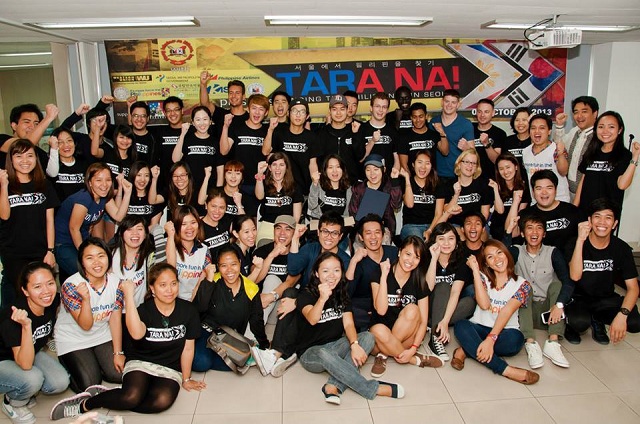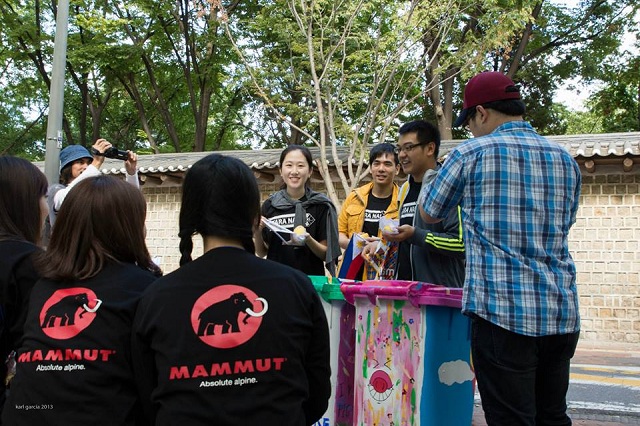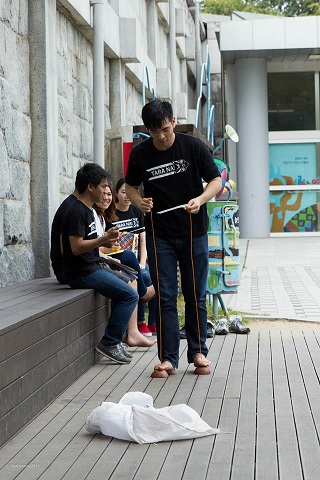ADVERTISEMENT
Filtered By: Cbb
Community Bulletin Board
Filipino students in Korea promote the Philippines

24 participants from eight nations (Korea, Greece, South Sudan, Germany, US, the Netherlands, Japan, and Vietnam) with members of Pinoy Iskolars sa Korea (PIKO) Inc.
Public diplomacy has never been so dynamic and energetic. The Pinoy Iskolars sa Korea, Inc. (PIKO), an organization of Filipino scholars studying in South Korean universities, led a one-of-a-kind event last October 6 that promoted Filipino culture in the form of a race in the South Korean capital.
International and Korean students who participated in the event were involved in different tasks related to Filipino culture around different spots in Seoul, from Filipino traditional games to matching Philippine tourism spots to buying Filipino vegetables in the infamous Hyewha Filipino Market.

International and Korean students who participated in the event were involved in different tasks related to Filipino culture around different spots in Seoul, from Filipino traditional games to matching Philippine tourism spots to buying Filipino vegetables in the infamous Hyewha Filipino Market.

Participants selling Philippine mangoes to the public to raise their transportation cost for the race.
Tara Na! Finding the Philippines in Seoul is a project led by PIKO in partnership with the Seoul Metropolitan City Government. “When we hear of a cultural event, it is usually [performed] on the stage: dancing, singing; and the audience will sit on the back. But we wanted to have an event with a twist,” says PIKO president Eva Wang. The event aimed to target a young audience, similar to the members of the organization, banking on their energy and vigor as the event might enable them to promote the Philippines in the future.
Various stations in the event were mementos to Philippine-Korea ties. The stations included the Korean War photo exhibit in Gwangwhamun, the Hyewha Filipino Market, the Children’s Museum of Korea, the Philippine Department of Tourism showroom, and the Philippine Embassy.
Teams of nine named after the different ethnolinguistics group in the Philippines sold Philippine mangoes to the public, solved a puzzle related to Philippine tourist spots, ate adobo in the DoT showroom, ate the infamous balut, and bought the vegetables mentioned found in the folk song "Bahay kubo" in Little Manila in Hyehwa.
 The participants also played Filipino traditional games like sack race and kadang-kadang to search for a Philippine item in the Discovery Box of the Children’s Museum of Korea.
The participants also played Filipino traditional games like sack race and kadang-kadang to search for a Philippine item in the Discovery Box of the Children’s Museum of Korea.
Teams also decoded the Baybayin/Alibata, the ancient Filipino writing system, to learn their destinations.
Finally, teams were welcomed by Maskara festival dancers in the Philippine Embassy Seoul.
Twenty-four participants aged 18-30 from Korea, Greece, South Sudan, Germany, United States of America, Netherlands, Japan, and Vietnam joined the event.
The event was sponsored as well by the Philippine Embassy in Seoul, Philippine Department of Tourism, Western Union, Children’s Museum of Korea and the Korea International Student Support Association (KISSA) and was supported by the Filipino Photographers in Korea (FILIPOS).
The event was the culmination of the cooperation between various Filipino groups that aim to promote the Philippines and international understanding. The organization looks forward to future opportunities to promote the Philippines and to serve as a bridge across the different cultures in South Korea.
The ties of the Philippines and Korea run deep, blossoming from the expeditionary support that the Philippine government sent to Korea during the Korean War to the people-to-people exchange between the two countries. There are about 100,000 South Korean nationals in the Philippines and around 50,000 Filipinos in South Korea, of which about a tenth live in Seoul.
The event was sponsored by the Philippine Embassy in Seoul, the Philippine Department of Tourism, Philippine Airlines (PAL), Western Union, Children’s Museum of Korea and the Korea International Student Support Association (KISSA) and supported by the Filipino Photographers in Korea (FILIPOS).
Press release from PIKO. Photos courtesy of FILIPOS.
Various stations in the event were mementos to Philippine-Korea ties. The stations included the Korean War photo exhibit in Gwangwhamun, the Hyewha Filipino Market, the Children’s Museum of Korea, the Philippine Department of Tourism showroom, and the Philippine Embassy.
Teams of nine named after the different ethnolinguistics group in the Philippines sold Philippine mangoes to the public, solved a puzzle related to Philippine tourist spots, ate adobo in the DoT showroom, ate the infamous balut, and bought the vegetables mentioned found in the folk song "Bahay kubo" in Little Manila in Hyehwa.

Kadang-kadang at the Children's Museum.
Teams also decoded the Baybayin/Alibata, the ancient Filipino writing system, to learn their destinations.
Finally, teams were welcomed by Maskara festival dancers in the Philippine Embassy Seoul.
Twenty-four participants aged 18-30 from Korea, Greece, South Sudan, Germany, United States of America, Netherlands, Japan, and Vietnam joined the event.
The event was sponsored as well by the Philippine Embassy in Seoul, Philippine Department of Tourism, Western Union, Children’s Museum of Korea and the Korea International Student Support Association (KISSA) and was supported by the Filipino Photographers in Korea (FILIPOS).
The event was the culmination of the cooperation between various Filipino groups that aim to promote the Philippines and international understanding. The organization looks forward to future opportunities to promote the Philippines and to serve as a bridge across the different cultures in South Korea.
The ties of the Philippines and Korea run deep, blossoming from the expeditionary support that the Philippine government sent to Korea during the Korean War to the people-to-people exchange between the two countries. There are about 100,000 South Korean nationals in the Philippines and around 50,000 Filipinos in South Korea, of which about a tenth live in Seoul.
The event was sponsored by the Philippine Embassy in Seoul, the Philippine Department of Tourism, Philippine Airlines (PAL), Western Union, Children’s Museum of Korea and the Korea International Student Support Association (KISSA) and supported by the Filipino Photographers in Korea (FILIPOS).
Press release from PIKO. Photos courtesy of FILIPOS.
Tags: southkorea, piko
More Videos
Most Popular




